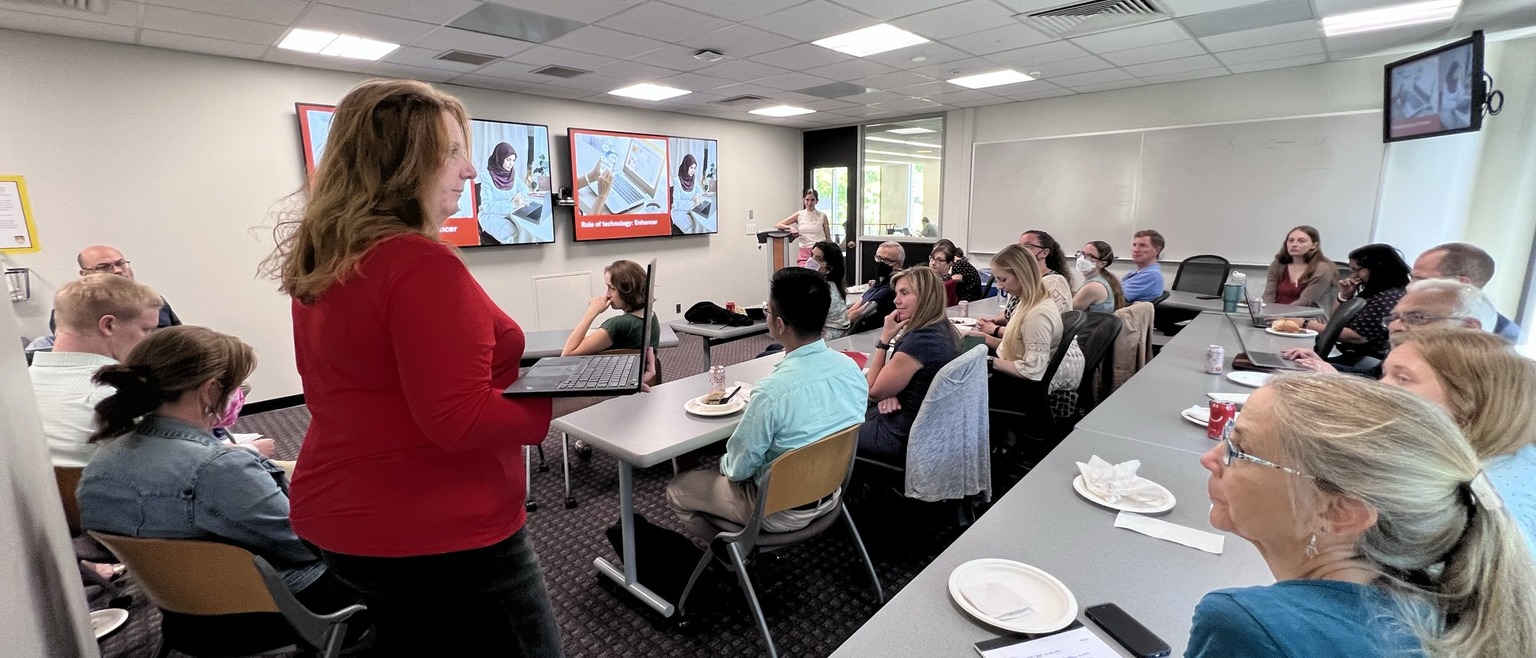Communities of Practice are "groups of people who share a concern or a passion for something they do and learn how to do it better as they interact regularly" (Green, et al., "Reviving Praxis," 248). Communities of Practice within the Center for Innovation in Teaching and Learning (CITL) at Lehigh have a simple format: a few meetings plus electronic communications between colleagues who want to learn from one another.
Active Communities of Practice
Interested in using an emerging technology or technique? Exploring some area of inquiry? Connecting with kindred colleagues at Lehigh? Collaborating with International Classrooms? Create or contribute to a Community of Practice sponsored by CITL! Active communities include:
- New Faculty [contact Instructional Technology Team]
- Virtual International Exchange (VIE) [contact VIE Team]
- Extended Reality (XR) [Join Group]
- Geographic Information Systems (GIS) [contact Jeremy Mack]
- Strategic Methods for AI-Responsive Teaching (SMART) [contact Justin Greenlee]
- Gaming & Game Studies [contact Chris Harvey]
About CITL Communities of Practice
Structure and Membership
There is no set structure for Communities of Practice at Lehigh. Each community sets its own format and picks its own leaders. As facilitators, CITL can send Calls for Participation to an intended audience–be it faculty, postdocs, graduate students, and/ or undergrads within the university. Communities of Practice are open and intergenerational. We value the ways they pass knowledge productively between early career and more established scholars.
CITL Support
CITL supports Communities of Practice across semesters and academic years. We focus our work on the planning stage and the first meeting. Our staff also join Communities of Practice as members once a group is formed and participate in conversations. We partner with group members on scheduling and planning meetings and contribute to session facilitation as meets the needs of the group.
CITL Communities of Practice vs. CITL Faculty Fellows
CITL also manages a Faculty Fellows program that accepts proposals for collaborations every semester. A committee of CITL staff read Faculty Fellow applications. Awardees are eligible to receive stipends to support efforts in specific courses.
By comparison, proposals for Community of Practice are brief and always accepted when there is sufficient interest and staff to support. Communities of Practice are not attached to any course. They receive a modest budget that covers food and drink.
Some collaborations within Communities of Practice develop into projects by Faculty Fellows. Like Faculty Fellows, Communities of Practice are encouraged to present at the annual CITL Symposium on Teaching and Learning.
Measures of Success
Communities of Practice create meaningful conversations between colleagues at Lehigh. We know we are succeeding as facilitators when there is an air of excitement within a given Community of Practice. We highlight the work of Communities of Practice in emails, newsletters, LTS social media, and CITL events, to name a few possibilities. We emphasize the preservation of some artifact–a recorded presentation, paper, website, online publication, or archive–that captures the activities of a Community of Practice.
How to Create a Community of Practice
Joining an existing Community of Practice at Lehigh is easy. Just visit one of our CITL web pages or a facilitator of a group (see above).
Here’s the process to create a new Community of Practice, sponsored by CITL:
Convene a core group of scholars and articulate the key goals and values of your Community of Practice. Keep in mind that a Community of Practice is most effective when it is "designed for evolution" (Carvalho-Filho, et al., "Twelve tips for implementing a community of practice," 144). Generate a set of ideas and be ready for change when new members join your community.
Propose your Community of Practice to CITL via this form. Potential topics extend across the study of teaching and learning, scholarship and service, and continuing professional development. Your topic can be narrow or broad–it just needs to appeal to a group! We hope that some proposals match what Leah Hakkola and her co-authors call "equity-mindedness" within Communities of Practice in academia (Hakkola, et al., "An Equity-Minded Approach to Faculty Development," 394). Please note that the proposal process is designed to be swift and informal. Proposals from faculty, postdocs, and graduate students are accepted year long. Communities of Practice typically launch in September and February.
CITL staff will read the proposal and schedule a consultation with you. We will ask questions like: Why is your Community of Practice important right now? What is your primary task or project? Who is or might be interested in joining? In what ways will you measure success? How will you share and preserve the knowledge you create?
The author(s) of the proposal and CITL staff will then collaborate on a Call for Participants that describes the Community of Practice and shares specifics of how to join. CITL can distribute the call to a specific group or across the university.
Most Communities of Practice begin with an in-person meeting devoted to logistics and getting to know one another. This session is often facilitated by a CITL staff member. Members of a Community of Practice will need to make some important decisions early on. For example: Who will lead the group? When and where will you meet? What modes of communication do you prefer? What do you want to discuss/ read/ write/ build/ do? How will you focus your efforts?
